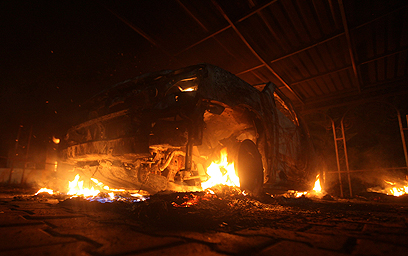
Scene of Benghazi attack
צילום: AP
4 State Department officials step down over Benghazi report
State Department security chief, three other senior officials relieved of their duties following probe into Libya attack which left four US diplomats dead
The US State Department's security chief had resigned from his post and three other officials had been relieved of their duties following a scathing official inquiry into the September 11 attack on the US mission in Benghazi.
Eric Boswell has resigned effective immediately as assistant secretary of state for diplomatic security, State Department spokeswoman Victoria Nuland said in a terse statement.
Related stories:
- State Dept. slammed over Libya attack
- Rice withdraws as US secretary of state candidate
- Report: Egypt nabs leader of Benghazi terror cell
A second official, speaking on condition of anonymity, said Boswell had not left the department entirely and remained a career official.
Nuland said that Boswell, and the three other officials, had all been put on administrative leave "pending further action."
An official panel that investigated the incident concluded that the Benghazi mission was completely unprepared to deal with the attack, which killed US Ambassador Christopher Stevens and three other Americans.
The unclassified version of the report, which was released on Tuesday, cited "leadership and management" deficiencies, poor coordination among officials and "real confusion" in Washington and in the field over who had the authority to make decisions on policy and security concerns.
"The ARB identified the performance of four officials, three in the Bureau of the Diplomatic Security and one in the Bureau of (Near Eastern) Affairs," Nuland said in her statement, referring to the panel known as an Accountability Review Board.

Scene of Benghazi attack (Photo: AP)
Secretary of State Hillary Clinton accepted Boswell's decision to resign effective immediately, the spokeswoman said.
"We did conclude that certain State Department bureau-level senior officials in critical positions of authority and responsibility in Washington demonstrated a lack of leadership and management ability appropriate for senior ranks," retired Admiral Michael Mullen, one of the heads of the inquiry, told reporters on Wednesday.
The panel's chair, retired Ambassador Thomas Pickering, said it had determined that responsibility for security shortcomings in Benghazi belonged at levels lower than Clinton's office.
"We fixed (responsibility) at the assistant secretary level, which is, in our view, the appropriate place to look for where the decision-making in fact takes place, where - if you like - the rubber hits the road," Pickering said after closed-door meetings with congressional committees.
The panel's report and the comments by its two lead authors suggested that Clinton, who accepted responsibility for the incident in a television interview about a month after the Benghazi attack, would not be held personally culpable.
- Receive Ynetnews updates directly to your desktop










